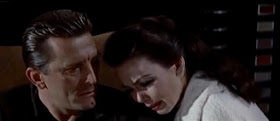 |
| Susan Sarandon and Jessica Lange |
FEUD: BETTE AND JOAN (8- part 2017 mini-series).
"
I can't
go into rehab -- I've got the Dean Martin roast!
" -- Bette Davis.
Movie legend Joan Crawford (Jessica Lange of
American Horror Story: Asylum) goes to see another movie legend, Bette Davis (Susan Sarandon of
The Other Side of Midnight), and offers her the title role in a film version of the novel "What Ever Happened to Baby Jane?" During filming with director Robert Aldrich (Alfred Molina of
Prick Up Your Ears), long-simmering resentments and rivalries resurface, and while the two women resolve to have a united front against the twin demons of ageism and sexism, jealousies and insecurities only drive them farther apart. It all culminates when Davis gets an Oscar nod and Crawford doesn't ...
 |
| The real Bette Davis and Joan Crawford |
Well, this incredibly entertaining and absorbing mini-series could have been a campy and horrible mess, but with intelligent writing and some excellent acting it emerges as a very memorable mini-series. (
Feud was not available for viewing while
Olivia de Havilland sued the production -- she lost -- but it is now back on Amazon Prime: $11.99 to own all eight Standard Definition episodes.) Let's get one thing out of the way.
Feud is
highly exaggerated and fictionalized, the actual "feud" between the two ladies being very over-stated to say the least. For much of their lives, Davis and Crawford were busy with careers, children and several bad marriages, and probably didn't think about each other all that much. It was the whole Oscar business -- Davis lost while Crawford accepted the coveted statuette on winner Anne Bancroft's behalf -- that undoubtedly started the "feud," and led to unpleasantness on the set of
Baby Jane follow-up
Hush ... Hush, Sweet Charlotte.

Now, as to the mini-series itself, once you get past the fabrications and dramatic licenses taken, it manages to go beyond its initial premise and explore the struggles of aging women played out against an industry where an old woman is simply considered a 'hag." The feminist angle is explored but never overwhelms the production, nor does it necessarily excuse the ladies' bad behavior, which could often be chalked up to extreme sensitivity on any number of issues. Of the two lead actresses, Lange comes off the best -- the real Crawford was much better-looking than Lange in her nearly grotesque make up, and had much more authority -- but otherwise Lange proves herself a fine actress and gives a commendable performance. Of the two icons, Davis was imitated much more than Crawford, so Sarandon had a dilemma: how to play a real person without coming off like a drag impersonator. Sarandon succeeds in making Davis seem real, but her performance is also a little dull -- for lack of a better word -- in comparison to Lange's. However, both women are good, although neither of them have the kind of intense power, personality or sheer charisma of the real Crawford and Davis. And when they recreate scenes from
Baby Jane? neither are as good as the original stars.
Feud benefits from some superb supporting performances: Alfred Molina as Robert Aldrich; Stanley Tucci as Jack Warner; Alison Wright as Aldrich's assistant Pauline Jameson; Molly Price as Aldrich's wife, Harriet; John Rubinstein as George Cukor; and especially Jackie Hoffman as Crawford's maid and companion, "Mamacita," and a scene-stealing Judy Davis [
Life with Judy Garland: Me and My Shadows] as Hedda Hopper. On the other hand, Catherine Zeta-Jones doesn't remind me of Olivia de Havilland at all (although you would think de Havilland would have been flattered that she was played by a much younger and beautiful actress.) And Kathy Bates makes a rather mediocre Joan Blondell. The sections showing them being interviewed about the feud could easily have been jettisoned.
Dominic Burgess seems to think that because his character, actor Victor Buono, was gay that he should play him more as a stereotype than he was in real life. While Buono is a colorful character, it's strange that
Feud completely omits Maidie Norman, the black actress who played the murdered maid Elvira in
Baby Jane? and who had a very interesting life
-- was it because she was a lifelong Republican?
Feud is perhaps more sympathetic to Joan than it is to Bette, and suggests that her daughter Christina's hateful memoirs were not entirely accurate, if at all.
It's interesting that the writers for this series must have done research by poring over bios of the two screen idols -- books such as
Fasten Your Seat Belts: The Passionate Life of Bette Davis and
Joan Crawford: The Essential Biography -- but none are given credit, and that even includes an exaggerated tome entitled
Bette and Joan: The Divine Feud!
Verdict: Fascinating, amusing, dramatic, even poignant look at old Hollywood and how stars desperately
cling to every inch they've gained while at times losing their humanity in the struggle. ***1/2.


























